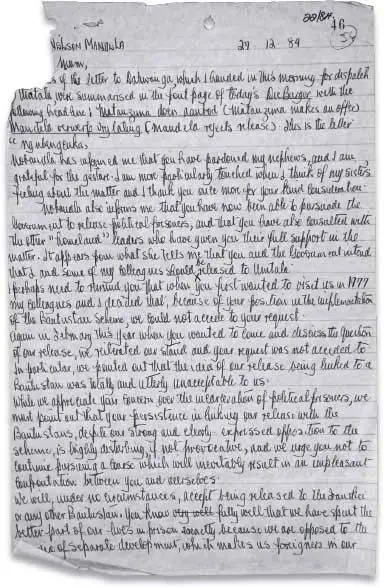That had a tremendous impact on me.
10. FROM A CONVERSATION WITH RICHARD STENGEL
[I don’t]…interfere in the affairs of others, unless I’m asked. Even when I’m asked, my own concern is always to bring people together. Even as a lawyer, when…a man or his wife comes to me to institute divorce action, I always say, ‘Have you done everything in your power to resolve this problem?’…Some people welcome that, and in fact I have saved marriages in that way. And then some people of course resent it. She comes to you because they have quarrelled…and she feels bitter, and when you say, ‘Can I call your husband?’ You see? Oh, she gets terribly agitated. And from that moment even when you go to court she does not even want you to look at her husband…You see she wants you to adopt exactly the same position which she adopts. It becomes very difficult. But the point is that I have always tried to bring people together, you know?…But I don’t always succeed.

.....................................................................................
From a letter to Winnie Mandela, dated 27 December 1984.
11. FROM A LETTER TO WINNIE MANDELA, DATED 27 DECEMBER 1984, QUOTING FROM A LETTER TO K D MATANZIMA11
It appears…that you and the Government intend that I and some of my colleagues should be released to Umtata.12 I perhaps need to remind you that when you first wanted to visit us in 1977 my colleagues and I decided that, because of your position in the implementation of the Bantustan Scheme, we could not concede to your request.13 Again in February this year when you wanted to come and discuss the question of our release, we reiterated our stand and your plan was not acceded to. In particular we pointed out that the idea of our release being linked to a Bantustan was totally and utterly unacceptable to us. While we appreciate your concern over the incarceration of political prisoners, we must point out that your persistence in linking our release with Bantustans, despite our clearly expressed opposition to the scheme, is highly disturbing, if not provocative, and we urge you not to continue pursuing a course which will inevitably result in an unpleasant confrontation between you and ourselves. We will, under no circumstances, accept being released to the Transkei or any other Bantustan. You know fully well that we have spent the latter part of our lives in prison exactly because we are opposed to the very idea of separate development, which makes us foreigners in our own country, and which enables the Government to perpetuate our oppression to this very day. We accordingly request you to desist from this explosive plan and we sincerely hope that this is the last time we will ever be pestered with it.
12. CONVERSATION WITH RICHARD STENGEL
Stengel: We left off last time talking about your trip in September 1955 when your bans expired,14 and you write quite a lot about it in your memoirs, in the manuscript, in great detail. Was the trip important to you because you felt like it was your last moment of freedom?
MANDELA: No, I had been banned from September, from December 1952. That was my first ban in terms of the Riotous Assemblies Act and that was for one year, and then on another occasion it was for two years. But in terms of the Suppression of Communism Act, I came to be banned and confined to Johannesburg for five years, and when the ban expired because it had not been possible for me to travel around, it was like a new chapter in my life and therefore I made it a point to see the country because I knew that the question of a ban and confinement to a particular area was something that was going to haunt me for the rest of my life as long as I was active politically. That really was the reason for the importance I attached to the trip.
13. CONVERSATION WITH RICHARD STENGEL
STENGEL: What was the International Club?
MANDELA:…The Johannesburg International Club was a club which made it possible for people of various national groups to meet…it was a place in town where people could meet and exchange views and receive visitors…and it served meals, there were games…debates, and so on. It was a place for social occasions. At one time there came an American, two American actors: Canada Lee…and this chap now, who is quite a top actor, Sidney Poitier. We entertained them there and it was a very interesting club; those days it was one of the few instances where you could have members of all national groups together.
STENGEL: And was it here in town? Where was it?
MANDELA: Yes, it was further down towards the west…
STENGEL: And you became secretary?
MANDELA: Yes, I became secretary.
STENGEL: There was also a fellow who – I believe he succeeded you as secretary, with whom you were friends – Gordon Goose.
MANDELA: Gordon Goose, yes, that’s right.
STENGEL: So you socialised with people.
MANDELA: Yes, an Englishman, who came from England, and a very religious man, married to a Jewish lady, Ursula. A blind lady, but very capable, very capable lady. She is now teaching; at least when I came out of jail I went to see them…One day Gordon was not going to be available at five o’clock to go and fetch his wife, so he asked me to [do it]. She was…working…a few blocks away from here in Commissioner Street. And I went there, I got hold of her. Now, because she was blind, she put her hand here [gestures], on the arm. And then I went out with her.
1 comment